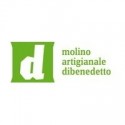 View larger
View larger Flour •Farro Triticum Dicoccum •Molino Dibenedetto •KG1 x 01
1019
- Remove this product from favorite's list.
- Add this product to list of favorites.
More info
Flour •Farro Triticum Dicoccum •Molino Dibenedetto •KG1 x 01
Spelled flour Emmer Kg 1 - ingredients: - manufacturer: Molino Dibenedetto
Farina di farro titicum dicoccum, ideale per fare il Pane, le Focacce, le Pizze, i Dolci.
Questa farina di farro triticum dicoccum è il frutto di una rigorosa selezione delle materie prime. Il farro triticum dicoccum è un cereale, parente stretto del grano, cresce anche su terreni poveri di elementi nutritivi e resiste naturalmente al freddo, alle malattie e agli agenti infestanti. Le farine e le semole di farro risultano leggermente aromatiche, adatte alla produzione di ottimi dolci e prodotti da forno.
Grazie ad un processo di macinazione artigianale, effettuato a freddo e composto da pochi passaggi, questa farina conserva tutte le qualità organolettiche del cereale.
Umidità max: 15.50%
Conservare in luogo fresco e asciutto, a temperatura non superiore ai 20°C.
CONTIENE GLUTINE
*le immagini mostrano l'aspetto esteriore del prodotto, le etichette vengono stampate singolarmente per ogni ordine.

info about producer: Molino Dibenedetto
Molino Artigianale Dibenedetto
Altamura, Bari, Puglia, Italy.
The origins of the Molino Artigianale Dibenedetto date back to the early 50s. The small mill factory - which at that time did not yet possess the actual name - was set up by Simone brothers, carpenters by profession. However, the business took off and in a few years the brothers accumulated a large debt. Many of their possessions were hypothecated they saw therefore forced to sell the business just started.
11 October of '58, the mill was bought by Michele Ferrulli, a farmer who owned land on the Murgia. The stipulated price, despite passing the six and a half million lire, was not enough to pay off the debt. The building, whose structure consisted primarily of wood, included a stall for horses since at the time the wheat and flour were carried on a wagon. There was a real craft that was to weigh and deliver the products attracting families with the sound of a bell.
In a short time Michael lifted the fortunes of the mill and in seven months recovered the amount spent for its purchase. Although two motors supply the several machines, most of the operations were performed manually, in fact, those who worked at the mill - very small to be honest - they were eight people. Michele took care to administer and coordinate, his daughter was the seller lady, the "mastro mugnaio" i.e. the miller controlling milling; there were also two conveyor and three workers. The mill operated for third parties, grinding the grain of families and deriving revenues from processing. The difference by today is that the flour was not sold to bakers because the families uses themselves to make bread, then brought the bread to the oven to be cooked.
In a short time Michael lifted the fortunes of the mill and in seven months recovered the amount spent for its purchase. Although two motors supply the several machines, most of the operations were performed manually, in fact, those who worked at the mill - very small to be honest - they were eight. Michele took care to administer and coordinate, his daughter was the lady at the sale, the Mastro miller controlling milling; there were also two conveyor and three workers. The mill operated for families, grinding the grain of families and deriving revenues from processing. A difference today the flour was not sold to bakers because the families themselves used to make bread, then brought to the oven to be cooked.
Some time later the Michele's grandson, Mario Dibenedetto, began to frequent the mill to give a hand to his grandfather following the death of his father. The main task of the child was to carry sacks of grain from the warehouse. Mario has continued to work there until, in 1992, when Michele died. Since then the company has acquired its current name and management is passed into his hands.
In 2002 the Molino Artigianale Dibenedetto mill was renovated, but buth the format both the machines remained almost unchanged. Unlike other companies in the sector that had moved to the suburbs and become large industrial complexes, the Molino Artigianale Dibenedetto mill is still located in the center of Altamura, safeguarding its history and traditional methods.
Currently Mario is helped by his son Paul, while Pina and Angela, his wife and his daughter, involved in the sale. The Molino Artigianale Dibenedetto family is always happy to show the mill and recount the origins and operation, as often happens when school children, the most discerning tourists or just curious pilgrims come.
COMMUNICATIONS
FROM THE OUR TEAM:
(**) We ship regularly; delivery time depends on the destination.
(***) We are updating our catalog, several product's sheets and categories may be empty. Please contact us if you need info about ingredients and product's facts.




